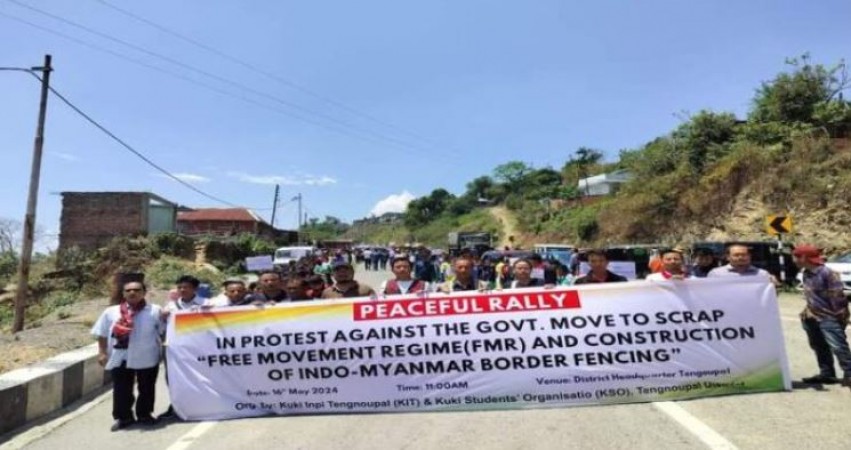
Imphal: The porous border with Myanmar continues to pose significant challenges for India's Northeastern states, particularly Manipur. Recent outbreaks of violence in Manipur have been directly linked to the open border, facilitating illegal drug trafficking and arms smuggling, thereby heightening security concerns for Indian authorities. The unrestricted border access also allows numerous militant groups from the region to infiltrate Indian territory at will, exacerbating the security situation. During the Manipur violence, hundreds of militants reportedly crossed into Indian territory through the open border, causing extensive damage.
Moreover, ongoing political and military turmoil in Myanmar has led to thousands of people entering Indian territory through the open border in the past three years. Around 50,000 Myanmar nationals have sought refuge in Mizoram and Manipur, raising serious demographic and security concerns. Manipur authorities have identified over 5,000 illegal intruders from Myanmar, with reports indicating the establishment of more than 996 illegal villages by these intruders.
In response to these grave issues and in consideration of national security, the central government took the decision in February 2024 to fence the Myanmar border and revoke the Free Movement Regime (FMR) with Myanmar. However, this decision has faced resistance from certain organizations in Manipur, Mizoram, and Nagaland.
On May 16, the Kuki Inpi Tengnoupal District (KIT) and the Kuki Students’ Organisation (KSO) Tengnoupal District in Manipur organized a massive rally denouncing the government's decision. Similarly, the Zo Reunification Organisation (Zoro) staged rallies in Mizoram, protesting against the dismantling of the FMR and the implementation of border fencing.
The protests are rooted in concerns about the cultural and social ties among ethnic communities that would be disrupted by the policy changes. Zoro, in particular, advocates for the reunification of Chin-Kuki-Mizo-Zomi tribes and opposes the border fencing and FMR abrogation.
Church bodies in Nagaland, Mizoram, and hill areas of Manipur are reportedly behind these protests, with Zoro being influenced by Christian leaders and advocating against the border policy changes. Sources suggest that Zoro is working towards establishing a greater Christian administrative region encompassing Chin-Kuki-Mizo-Zomi tribes of Manipur, Mizoram, and Myanmar.
Opposition to the fencing and FMR abrogation has also been voiced by Mizoram and Nagaland assemblies, civil society organizations, and student bodies. Mizoram, in particular, is housing over 34,000 Chin refugees following the military coup in Myanmar, and there is reluctance to deport them due to shared ethnic ties.
These protests underscore deep-seated concerns and opposition to the government's border policy. As tensions rise, authorities must address the grievances of affected communities and navigate the complex socio-political landscape of the region.
Pakistan Mulls Extension of USD15.5 Billion Chinese Energy Debt Amid IMF Talks
Uttarakhand CM Announces Master Plan for Char Dham Yatra
Member of Himanshu Bhau Gang Killed in Delhi Police Encounter